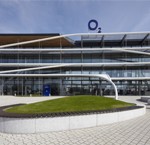Sky to buy Telefónica UK’s broadband
March 1, 2013
 Sky has reached an agreement with Telefónica UK for the proposed acquisition of its O2 and BE consumer broadband and fixed-line telephony business. The transaction will make Sky the second-largest provider in the UK broadband market.
Sky has reached an agreement with Telefónica UK for the proposed acquisition of its O2 and BE consumer broadband and fixed-line telephony business. The transaction will make Sky the second-largest provider in the UK broadband market.
Telefónica UK’s consumer broadband and fixed-line telephony customers, of which there are currently over half a million, will become Sky customers for those services on completion.
Under the terms of the agreement, Sky will pay a consideration of £180 million to Telefónica UK for the consumer broadband, home phone and line rental customers served by the O2 and BE brands. An extra contingent amount, not exceeding £20 million, may be payable dependent upon the successful delivery and completion of the customer migration process by Telefónica UK. Post completion, O2 and BE customers will be migrated onto Sky’s fully unbundled network, supported by a nationwide all-fibre core, which reaches 84 per cent of all UK homes.
Following sustained growth in demand for broadband and home telephony since it entered the home communications market six years ago, Sky has built a business with 4.2 million broadband customers and 4 million telephony customers (as at December 31st 2012). In that time, Sky has established itself as the UK’s most popular triple-play provider with 3.6 million triple-play customers, one third of its base.
Jeremy Darroch, Sky’s Chief Executive, said: “Sky has been the UK’s fastest-growing broadband and telephony provider since we entered the market six years ago. From a standing start in 2006, we have added more than 4.2 million broadband customers. The acquisition of Telefónica UK’s consumer broadband and fixed-line telephony business will help us accelerate this growth.
According to Emeka Obiodu, telco strategy analyst at Ovum, the takeover was significant on several fronts. “Firstly, it makes BSkyB the second largest broadband provider in the UK. This strengthens the hand of BSkyB in the market as the company would now be able to boast of having a bigger TV customer base, and more broadband customers than its main rival – Virgin Media. Such a prospect will concern Liberty Global a bit when it moved to take over Virgin Media in February.
Secondly, the battle for pay-TV and broadband supremacy in the UK has now intensified strongly. BT, the largest broadband provider, has spent heavily to win TV rights, and earlier this week, took over ESPN’s UK and Ireland TV channels. Now BSkyB, the UK’s largest pay-TV provider, has moved swiftly to become the second largest broadband provider. Such a consolidation, in addition to Virgin Media, will undoubtedly convert the UK’s pay-TV and broadband markets into a three-way fight. It doesn’t have to be bad for consumers, but some may not like it.
Thirdly, for those who don’t like the consolidation of the market to three main pay-TV and broadband providers, this is the inevitable consequence of technology changes and intense competition. Local loop unbundling has largely run its course and any broadband provider that wants to remain relevant in the future will need to outline a path to fibre. But that costs money. And with retail prices so low, and the return on investment tough to earn, pure-play broadband providers will struggle to survive. The market is now left with players that are able to spread the cost of fibre across more services, with its attendant economies of scope benefits.
Fourthly, for O2, this is significant as it now puts its hopes for a broadband future on LTE, combined with Wi-Fi. In the recent auction it won spectrum in the 800 MHz band, which will be good for providing coverage, albeit with limited capacity. But it is interesting that it didn’t get spectrum in the 2.6GHz band, which would have been good for high capacity broadband over shorter distances. Whether this was a strategic choice or a result of being outbid remains to be seen, as Ofcom is yet to publish the bid history. However, it means that for its broadband services O2 will have to rely on 800MHz spectrum and its existing spectrum holdings (unless a rival is willing to trade spectrum) combined with the Wi-Fi push it instigated in 2011. Its own fixed line home broadband service is no longer an option.
Fifthly, this sale reduces the power of UK mobile operators in the converged space. At a time when telcos across Europe are intensifying efforts to offer converged (fixed, mobile, broadband, TV) services, mobile telcos in the UK are making themselves much more reliant on mobile. EE still retains a presence in the fixed telecoms space but its offering is increasingly infrastructure-light. Ultimately, this is a dangerous scenario as it might reduce the strategic manoeuverability of the UK’s mobile telcos in a converged future.”
